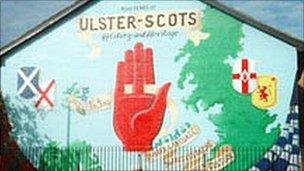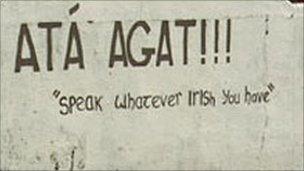Euro experts blow to Executive language strategy
- Published

Ulster-Scots is described as "largely invisible" in public life
A European committee of linguistic experts has criticised the NI Executive's treatment of both Irish and Ulster-Scots.
The body, which is part of the Council of Europe, says the Westminster government should implement an Irish Language Act as soon as possible.
It also calls for legislation to allow the use of Irish in court.
The Executive was also censured for failing to make a submission to the committee.
The so-called Committee of Experts is responsible for examining how minority and regional languages are treated by government.
'Standstill'
Its focus is ensuring that the languages are treated according to their respective standing - Irish has currently reached Part III protection under the European Charter, while Ulster-Scots' development is a stage behind.
In the report, external, which was published in May, it criticises the Executive's lack of action on language strategy, arguing that the restoration of power-sharing had led to a "de-facto standstill" in the promotion of Irish and Ulster-Scots.
It singles out an Assembly motion by Ulster Unionist MLA David McNarry in 2007 to prevent the use of Irish in the Stormont chamber.
The report states: "Such actions and statements are in the view of the Committee of Experts adverse to the aim of creating mutual understanding, respect and tolerance towards the speakers of regional or minority languages in Northern Ireland."
Opposition
The DUP's continued opposition to an Irish Language Act in favour of a language strategy for both Irish and Ulster-Scots also comes in for criticism.
The committee says it agrees with a submission by the Northern Ireland Human Rights Commission (NIHRC) that specific legislation is required for Irish.
It says that if the Executive continues to veto such a move, then the government in Westminster should intervene.
"The Committee of Experts is concerned that the strategy will strive towards parity between the two languages and therefore not serve the needs of either the Irish-speakers or the Ulster-Scots speakers and will hold back the development of both languages," the report states.

The report calls for an Irish Language Act
It adds that "a legislative basis is even more important in the environment of political conflict, as a means of achieving reconciliation".
Provision for Irish speakers in the courts is another area of focus.
Last year, an Irish speaker from west Belfast was unsuccessful in a legal challenge to the ban, which has been in place since 1737.
The committee says that the ban on speaking Irish in court is "contrary to the spirit and objectives of the Charter and the general commitment of the UK authorities to protect and promote Irish".
'Largely invisible'
In terms of Ulster-Scots, the committee says that the language is "largely invisible" in public life.
It goes on to examine the failure of the Ulster-Scots Academy, the landmark language project which failed to get off the ground despite being promised £15m of government funding.
An implementation group responsible for delivering the project by 2007 argued so much that it was disbanded and three years on, little progress appears to have been made towards setting up an Academy.
The committee, despite not receiving any information directly from the Executive, says it understands that the Department of Culture, Arts and Leisure still intends to go ahead with the project.
Crucially, in light of how some Ulster-Scots enthusiasts have called for a greater focus on cultural activities, the report says that the Academy's remit is likely not only to focus on language but also on "cultural aspects and community education".
The majority of the information gathered in the report came from the UK government, which still has some language responsibilities, and from non-governmental organisations such as the Ulster-Scots Agency and the Irish language group Pobal.
The Executive did not make any submission because it could not agree on a common position, despite coming under pressure from the Foreign Office to do so.
The DUP minister for Culture, Arts and Leisure at the time, Gregory Campbell, blamed the deputy first minister for holding up the process.
The committee said it "deeply regretted" the Executive's failure to make any submission.